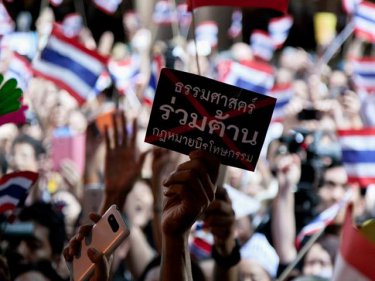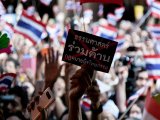PHUKET: Protesters from Phuket joined thousands in Bangkok today in a widening street outburst against the Thai Government's Amnesty Bill. The division is splitting Thailand beyond conventional ''red'' and ''yellow'' lines.
Academics, doctors and some other professionals have been regularly declaring support for the anti-amnesty movement, even though some would certainly have supported the ''red'' government on other issues.
What the government sees as a bill promoting forgiveness and reconciliation is viewed by its opponents as a concession to the corrupt and an avenue to permit the return to Thailand of fugitive former Prime Minister Thaksin Shinawatra.
No precise figures could be obtained late today for the numbers of protesters on the streets in Bangkok tonight.
Instead of heading for Samsen train station, the street march leaders took the demonstrators directly to the high-profile Victory Monument, a central capital tourist attraction.
With the contentious bill passing the House of Representatives on Halloween night, the Senate vote on November 11 is emerging as a key date for both sides.
Back in 2010, the ''yellow'' government allowed ''red'' protesters to occupy the streets for days. The result: a deadly showdown in which military intervention led to the killing of 90 people.
Where the right to protest begins in Thailand is easy to determine. Where it ends is much more difficult to decide.
It would be a surprise, though, if the government lets protesters stay on the streets of Bangkok until November 11.
The government will probably take advice from Khun Thaksin, the power behind the scenes. His sister, Yingluck, the present Prime Minister, has been careful to not be seen as a puppet in the two-and-a-half years that she has been in power.
Thailand has been relatively stable in that period. However, the tension has always been there.
This issue certainly has the potential to turn ''red'' against ''red'' and give the opposition movement thousands of new allies, even though ''yellow'' leaders are at pains to make the point that this protest is about right and wrong, not colors.
Academics, doctors and some other professionals have been regularly declaring support for the anti-amnesty movement, even though some would certainly have supported the ''red'' government on other issues.
What the government sees as a bill promoting forgiveness and reconciliation is viewed by its opponents as a concession to the corrupt and an avenue to permit the return to Thailand of fugitive former Prime Minister Thaksin Shinawatra.
No precise figures could be obtained late today for the numbers of protesters on the streets in Bangkok tonight.
Instead of heading for Samsen train station, the street march leaders took the demonstrators directly to the high-profile Victory Monument, a central capital tourist attraction.
With the contentious bill passing the House of Representatives on Halloween night, the Senate vote on November 11 is emerging as a key date for both sides.
Back in 2010, the ''yellow'' government allowed ''red'' protesters to occupy the streets for days. The result: a deadly showdown in which military intervention led to the killing of 90 people.
Where the right to protest begins in Thailand is easy to determine. Where it ends is much more difficult to decide.
It would be a surprise, though, if the government lets protesters stay on the streets of Bangkok until November 11.
The government will probably take advice from Khun Thaksin, the power behind the scenes. His sister, Yingluck, the present Prime Minister, has been careful to not be seen as a puppet in the two-and-a-half years that she has been in power.
Thailand has been relatively stable in that period. However, the tension has always been there.
This issue certainly has the potential to turn ''red'' against ''red'' and give the opposition movement thousands of new allies, even though ''yellow'' leaders are at pains to make the point that this protest is about right and wrong, not colors.






















